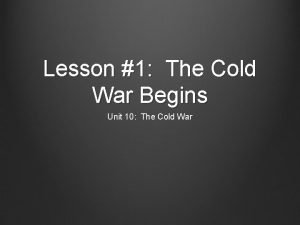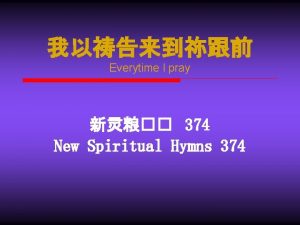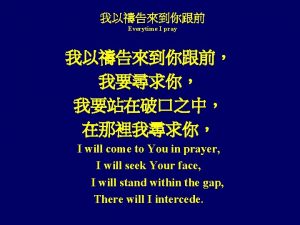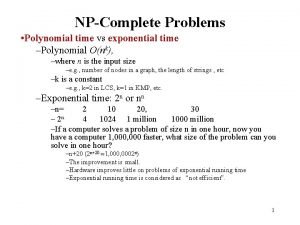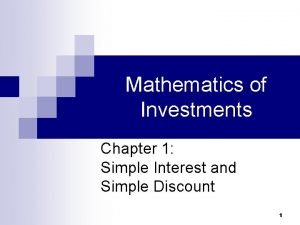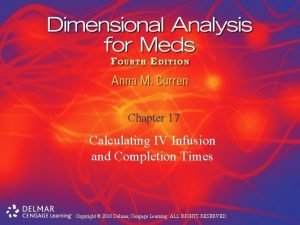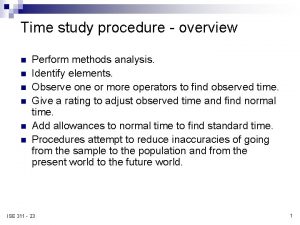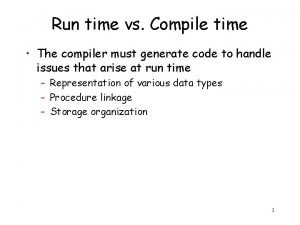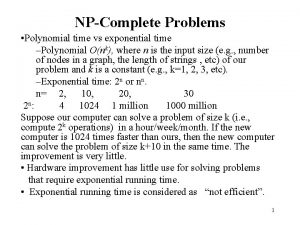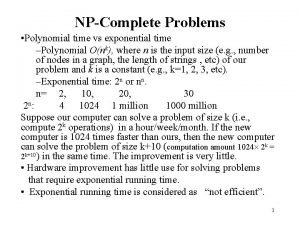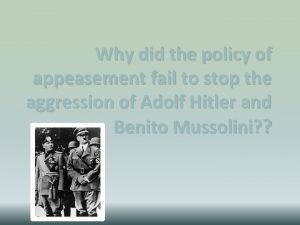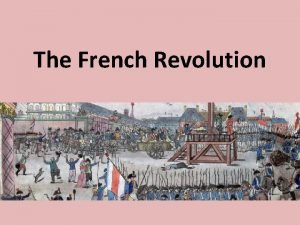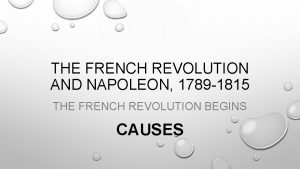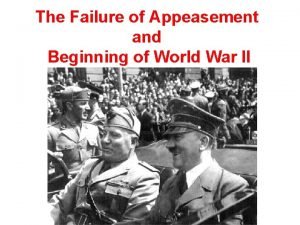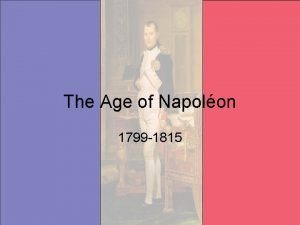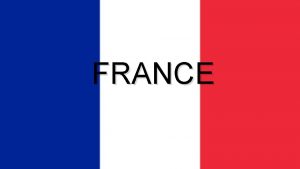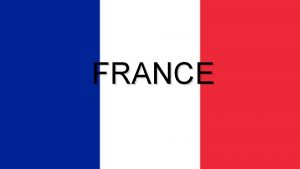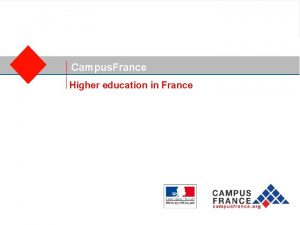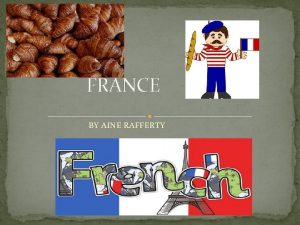Every Time France Sneezes Europe Catches A Cold










































































- Slides: 74

“Every Time France Sneezes, Europe Catches A Cold. ” A Revolutionary poster with the motto of the French Revolution: Unity, Indivisibility of the French Republic, Liberty, Equality and Brotherhood – or death Source, click here.

Age of Montesquieu (1789 -1792) The Limited Monarchy Age of Voltaire Rousseau (1792 (1799 -1815) -1799) The Republic & Reign of Terror Napoleon’s Empire

How did Louis XV contribute to the economic and political breakdown of Absolutism in France? What role did the parlements play in the oncoming revolution? Which gear would be which? Political causes, social causes, economic causes? ? ? ?

First Estate the clergy were exempt from taxes The Nobility owned 25% of land was regaining power since the death of the Louis XIV allowed to tax the peasants for their own profit The Third Estate bourgeoisie and peasantry taxes paid included the taille Tithe income tax poll tax salt tax the peasants resented old feudal privileges such as the hunting rights and the corvee system the bourgeoisie demanded political and social power and resented the first and second seats they especially hated the Lettre de cachet

The French Monarchy: 1775 - 1793 Marie Antoinette & Louis XVI

Marie Antoinette and the Royal Children

Marie Antoinette’s “Peasant Cottage”

Marie Antoinette’s “Peasant Cottage”

Let Them Eat Cake! • Marie Antoinette NEVER said that! • “Madame Deficit” • “The Austrian Whore”

1. Unfair Class & Tax System Tax problems was intensified due to famine and poor harvests But was “class warfare” theory accurate? 2. influence of the American Revolution How? 3. increase criticism of the French government by rising expectations of the Enlightenment - especially attacking divine right theory Other criticisms of French Government?

4. Financial Mismanagement France is nearly bankrupt - by the 1780 s half of France's annual budget for payment of interest on the mounting debt France's government could not declare bankruptcy and France had no central bank paper currency or means of creating credit government was dependent on poorest classes for revenue because the first two estates refused to pay taxes Jacques Necker Louis XVI’s finance minister tried to tax the upper estates and was dismissed Louis XVI summoned an Assembly of Notables to approve a new tax program that would remove noble and clergy tax exemption nobles refused and demanded control over government spending Louis XVI refused and it was clear that such changes needed approval from the Estates General on July 5 1788 King summoned first spring session of the Estates General

Louis XVI Calls the Estates General in 1789 Why? Each estate was asked to bring a cahier de dolenaces which is the complete list of suggestions and grievances to present to the king Some common agreements among the three estates France should have A constitutional monarchy Individual liberties must be guaranteed by law abolition of internal trade barriers

Delegates to the Estates General from the Third Estate Why? The main issue dividing the estates was how they should vote The Parlement of Paris ruled that the voting should follow the old traditional way which had Each estate voting separately the system clearly does not work and is clearly outdated the six week deadlock followed until the Third Estate asserted its power in June aided by some defected from the upper two estates National Assembly Called members from other estates to join and help write a constitution Famous Tennis Court Oath: The group wouldn’t disband before drawing up a constitution Sketch by Jacques-Louis David of the Tennis Court Oath www. wikipedia. org

What is the Third Estate? üEverything üclaimed the third estate should have power in France üThe nobility should be abolished üUsed Rousseau’s social contract ideas Abbé Sieyès 1748 -1836

Y He borrowed his terms from pathology. Y Compares a revolution to a fever or a disease: § The revolutionary “fever” begins with the appearance of certain “symptoms. ” § It proceeds by advances and retreats to a crisis stage, or “delirium. ” § The crisis ends when the “fever” breaks. § A period of convalescence follows, interrupted by a relapse or two before the recovery is complete.

1. People from all social classes are discontented. 2. People feel restless and held down by unacceptable restrictions in society, religion, the economy or the govt. 3. People are hopeful about the future, but they are being forced to accept less than they had hoped for. 4. People are beginning to think of themselves as belonging to a social class, and there is a growing bitterness between social classes. 5. The social classes closest to one another are the most hostile.

6. The scholars and thinkers give up on the way their society operates. 7. The government does not respond to the needs of its society. 8. The leaders of the government and the ruling class begin to doubt themselves. Some join with the opposition groups. 9. The government is unable to get enough support from any group to save itself. 10. The government cannot organize its finances correctly and is either going bankrupt or trying to tax heavily and unjustly.

July 14 1789 the Parisian Revolution began in response to food shortages and soaring bread prices the Kings dismissal of his Liberal finance Minister created panic in workers and tradesmen began to arm themselves On July 14 and angry mob stormed the Bastille in search of gunpowder and weapons Citizens appointed the Marquis de Lafayette to command the city's forces in Paris was lost to the King Symbol of French Revolution and Blow to Tyranny


The Great Fear peasants attacked manor houses in order to destroy manorial records of feudal obligation taxes went unpaid middle class responded by forming a National Guard militia to protect property rights Famine + Fear = Crazy Peasants Paris in Arms Revolutionary Center Factions (small groups) competed for power Marquis de Lafayette peasants go crazy over the nobles who were trying to reimpose medieval dues Headed National Guard – middle class militia formed in response to the royal troops in Paris Radical Paris Commune Replaced the royalists government of the city Could mobilize whole neighborhoods for protests or violent Actions to further the Revolution

August 4 th Vote – What did it establish? National assembly voted to abolish feudalism Declared equality of taxation Ended hunting rights for nobles fees for justice Ended village monopolies Ended Corvee system Declaration of the Rights of Man and Citizen became the constitutional blueprint for France I was influenced by the American constitutional ideas Enlightenment philosophy men are born and remain free and equal in rights natural rights are liberty property security and resistance to oppression expression of the General Will freedom of expression and religion liberty defined as freedom to do anything not injurious to others which was to be determined only by law taxes could be raised only with common consent separation of powers to separate branches citizen is to be applied to all French people regardless of class Louis XIV refused to accept decrees on the abolition of feudalism and declaration of rights

Olympe de Gouges Declaration of the Rights of Women and Female Citizen women did not share any equal rights she applied the 17 articles to women asserted the right of women to divorce and control property marriage access to higher education and public employment

Why did the women march to Versailles? March was in reaction to bread shortages incited by Jean-Paul Marat women invaded royal apartments slaughtered bodyguards demanded the king and queen moved to Paris and reside in Tuleries Palace

1790 – Civil Constitution of the Clergy secularized religion created national church with 83 bishops and dioceses convents and monasteries were abolished church property was seized to pay debt clergy forced to take a loyalty oath to new government Pope condemns action half French priest refused to accept became the refactory clergy Constitution of 1791 France becomes a constitutional monarchy with a unicameral legislature named legislative assembly Legislative assembly established to make laws and collect taxes, and decide issues of war nobility is abolished national assembly divided France and 83 departments uniform in ministry of structure Protected Private property Supported free trade

metric system replaced system of weights and measures Le Chapelier Law 1791 out what strikes worker coalitions and assemblies Assignats became new paper currency former church property was used to guarantee value lot of church lands sold the peasants to pay national that

1. Impossible demands made of government which, if granted, would mean its end. 2. Unsuccessful government attempts to suppress revolutionaries. 3. Revolutionaries gain power and seem united. 4. Once in power, revolutionaries begin to quarrel among themselves, and unity begins to dissolve. 5. The moderates gain the leadership but fail to satisfy those who insist on further changes.

6. Power is gained by progressively more radical groups until finally a lunatic fringe gains almost complete control. 7. A strong man emerges and assumes great power. 8. The extremists try to create a “heaven-on-earth” by introducing their whole program and by punishing all of their opponents. 9. A period of terror [extreme violence] occurs. 10. Moderate groups regain power. THE REVOLUTION IS OVER!

Louis XVI’s failed flight to Varennes Louis XVI try to escape France in June 1791 to avoid having to approve the Constitution and read a counter revolutionary army he was recognized with the Queen at the border and forced to accept the Constitution Reaction outside France European rulers denounced the Revolution increased border patrols Émigrés – nobles, clergy and others fleeing revolutionary France Some who supported the American Revolution put down the French Revolution The return of the royal family to Paris on 25 June 1791, colored copperplate after a drawing of Jean-Louis Prieur www. wikipedia. org

ØThe conservative response to the French Revolution Ødefended inherited privileges especially those of the English monarchy and aristocracy Øpredicted anarchy and dictatorship in France

Radical Groups Gain Popularity in the Legislative Assembly Sans-culottes: working class men and women demanded radical action – a republic Jacobins – political club middle class lawyers and intellectuals who wanted a republic Wanted government to guarantee them a living wage Girondins – a group of Jacobins led the nation into war Declaration of Pilnitz Issued by Prussia and Austria in 1791 Austrian Emperor Leopold would be willing to take military steps to restore order to France if all other powers joined him Really a bluff intended to slow down the revolution and rid his country of emigres In response the Legislative Assembly declared war on Austria in April 1792 Girondins became the party of interational revolution and claimed the revolution could never be secure in France until it spread to the world Typical Sans-Culottes Louis-Léopold Boilly www. wikipedia. org

French Revolutionary forces were soundly defeated by the Austrian military Jacobins blamed their defeat on Louis XVI believing he was part of a conspiracy with Prussia and Austria

The First Coalition & The Brunswick Manifesto (August 3, 1792) Duke of Brunswick if the Royal Family is harmed, Paris will be leveled!! FRANCE 17921797 AUSTRIA PRUSSIA BRITAIN SPAIN PIEDMONT In reaction to manifesto Jacobin mobs seized power in Paris and stormed Tuleries to take the king prisoner.

The Storming of the Tuilieres: August 9 -10, 1792 This was triggered in part by the publication in Paris of the August 3 Brunswick Manifesto, which confirmed popular suspicions concerning the king’s treason.

French Soldiers & the Tricolor: Vive Le Patrie! V The French armies were ill-prepared for the conflict. V ½ of the officer corps had emigrated. V Many men disserted. V New recruits were enthusiastic, but ill-trained. V French troops often broke ranks and fled in disorder.

French Expansion: 1791 -1799

The “Second” French Revolution M The National Convention: § Girondin Rule: 1792 -1793 § Jacobin Rule: 1793 -1794 [“Reign of Terror”] § Thermidorian Reaction: 1795 1794 - M The Directory 1795 -1799

Attitudes & actions of monarchy & court Fear of Counter. Revolution Religious divisions The Causes of Instability in France 1792 - 1795 Economic Crises War Political divisions

Revolutionary government set up in Paris which took power from the Legislative Assembly Led by Georges-Jacques Danton Legislative Assembly suspend Constitution of 1791 and order new elections based on universal male suffrage Wanted to move France into a republic

The September Massacres, 1792 M Rumors spreadt that imprisoned counter revolutionaries Were plotting with foreign invaders M Buveurs de sang [“drinkers of blood. ”] over 1000 killed! M It discredited the Revolution among its remaining sympathizers abroad.

The National Convention 1792 -1795 New constitution in 1792 making France a Republic based on the ideas of Equality, Fraternity and Liberty Its first act was the formal abolition of the monarchy on September 22, 1792. The Year I of the French Republic. The Decree of Fraternity it offered French assistance to any subject peoples who wished to overthrow their governments.

Two factions emerge Girondins Moderate group as compared to the Mountain The Mountain – radical republicans Leaders Danton, Robespierre Sans-culottes Became very influential on the National Convention

The Political Spectrum TODAY: 1790 s: Montagnards The Plain (swing votes) Girondists (“The Mountain”) Monarchíen (Royalists) Jacobins

The Sans-Culottes Depicted as Savages by a British Cartoonist.

The “Purifying” Pot of the Jacobin

Revolutionary Army Victories Prussians were stopped at the indecisive Battle of Valmy on September 20, 1792 Battle of Jemappes: First major victory for France resulted in the occupation of the entire Austrian Netherlands by November 1792 February 1793, The National Convention declared war on Britain, Holland Spain in addition to its war with Austria and Prussia

Louis XVI’s Head (January 21, 1793) • For the Mountain (Montagnards), the king was a traitor. • The Girondins felt that the Revolution had gone far enough and didn’t want to execute the king [maybe exile him]. • The trial of the king was hastened by the discovery in a secret cupboard in the Tuilieres of a cache of documents. • They proved conclusively Louis’ knowledge and encouragement of foreign intervention. • The National Convention voted 387 to 334 to execute the monarchs.

The Death of “Citizen” Louis Capet Matter for reflection for the crowned jugglers. So impure blood doesn’t soil our land!

Marie Antoinette on the Way to the Guillotine

Marie Antoinette Died in October, 1793

The Mountain Gains Control of the National Convention The Mountain believed the Girondins would ally with Conservatives and royalists to retain power Enrages – radical working class leaders in Paris – seized and arrested 31 Girondist members of the National Convention. Left the Mountain in control. Many Girondins fled Pairs and worked against the Revolution Marat is killed by Charolette Corday, a Girondin supporter “The Death of Marat” by Jacques Louis David, 1793

Revolutionary Tribunal in Paris: try suspected counter-revolutionaries Representatives on Mission Watch Committees Sanctioned the trial and executions of rebels and émigrés should they ever return to France Committee of Public Safety Emergence government to deal with internal and external challenges to the revolution Led by Maximillien Robespierre To protect France from threats at home and abroad Influenced heavily by Rousseau

Law of Maximum - September 5, 1793. § A planned economy to respond to food shortages and related economic problems § Limited prices of grain & other essentials to 1/3 above the 1790 prices & wages to ½ of 1790 figures. § Prices would be strictly enforced. § Hoarders rooted out and punished. § Food supplies would be secured by the army Law of Suspects September 17, 1793. Alleged enemies of the revolution were brought before Revolutionary tribunals that were created to hear cases of treason This law was so widely drawn that almost anyone not expressing enthusiastic support for the republic could be placed under arrest!

The Levee en Masse: An Entire Nation at Arms! – 500, 000 Soldiers • Lazare Carnot reorganized the French Army • By July 1794, Austrian Netherlands and the Rhineland were once again controlled by France • First coalition was falling apart • The planned economy made mobilization effective • Nationalism became a strong force uniting French people An army based on merit, not birth!

The Reign of Terror is nothing other than justice, prompt, severe, inflexible. -Robespierre Let terror be the order of the day! c c The Revolutionary Tribunal of Paris alone executed 2, 639 victims in 15 months. The total number of victims nationwide was over 40, 000!

Different Social Classes Executed 8% 7% 28% 25% 31%

The “Monster” Guillotine The last guillotine execution in France was in 1977!

War of Resistance to the Revolution: The Vendee Revolt, 1793

Vendee Revolt, 1793 Drowning the Traitors! Vendee Symbol: For God & the King!

Why was there a Revolt in the Vendee? 1. The need for 300, 000 French troops for the war effort. 2. Rural peasantry still highly taxed. 3. Resentment of the Civil Constitution the Clergy. 4. Peasants had failed to benefit from the sale of church lands. TARGETS: Local government officials National Guardsmen Jurying priests

Political Propaganda

Religious Terror: De-Christianization (1793 -1794) M The Catholic Church was linked with real or potential counter-revolution. M Religion was associated with the Ancien Régime and superstitious practices. M Very popular among the sans-culottes. M Therefore, religion had no place in a rational, secular republic!

The De-Christianization Program 1. The adoption of a new Republican Calendar: e abolished Sundays & religious holidays. e months named after seasonal features. e 7 -day weeks replaced by 10 -day decades. e the yearly calendar was dated from the creation of the Republic [Sept. 22, 1792] The Convention symbolically divorced the state from the Church!!

The New Republican Calendar New Name Meaning Time Period Vendemaire Vintage September 22 – October 21 Brumaire Fog October 22 – November 20 Frimaire Frost November 21 – December 20 Nivose Snow December 21 – January 19 Pluviose Rain January 20 – February 18 Ventose Wind February 19 – March 20 Germinal Budding March 21 – April 19 Floreal Flowers April 20 – May 19 Prairial Meadow May 20 – June 18 Messidor Harvest June 19 – July 18 Thermidor Heat July 19 – August 17 Fructidor Fruit August 18 – September 21

A New Republican Calendar Year I 1792 – 1793 II 1793 – 1794 III 1794 – 1795 IV 1795 – 1796 V 1796 – 1797 VI 1797 – 1798 VII 1798 – 1799 VIII 1799 – 1800 IX 1800 – 1801 X 1801 – 1802 XI 1802 – 1803 XII 1803 – 1804 XIII 1804 – 1805 XIV 1805 The Gregorian System returned in 1806.

The De-Christianization Program 2. The public exercise of religion was banned. 3. The Paris Commune supported the: e destruction of religious & royal statues. e ban on clerical dress. e encouragement of the clergy to give up their vocations. 4. The Cathedral of Notre Dame in Paris was turned into the “Temple of Reason. ” 5. The deportation of priests denounced by six citizens.

The Festival of Supreme Being A new secular holiday

Backlash to the De-Christianization Program M It alienated most of the population (especially in the rural areas). M Robespierre never supported it. § he persuaded the Convention to reaffirm the principle of religious toleration. M Decree on the “Liberty of Cults” was passed § December 6, 1793. § BUT, it had little practical effect!

The Radical’s Arms: No God! No Religion! No King! No Constitution!

The Terror Intensified: March to July, 1794 Jacques Hébert & the Hérbetists Danton & the “Indulgents” Executed in April, 1794 Executed in March, 1794 Jacques Herbert & Herbertistes Radical social democrat who led the “angry men” Extreme terrorists Were responsible for deaths of 2, 000 people at Nantes where they were loaded on barges and drowned • Law of 22 Prairial [June 10, 1794]. • Trials were now limited to deciding only on liberty OR death, with defendants having no rights. • Were you an “enemy of the people? ” (the law was so broadly written that almost anyone could fall within its definition!) • 1, 500 executed between June & July.

Thermodorian Reaction constituted bourgeoisie a significant swing to the right reasserted their authority to reduce the power of the Committee of Public Safety they closed the Jacobin club July 27, 1794 Robespierre was denounced in the Convention arrested and executed the next day along with Danton assembly feared they might be next Herbert and left-wing radicals were also executed Churches allowed to reopen New Constitution (1795) which created the Directory

The Directory (1795 – 1799) Republican form of government five-man directory and bicameral legislature more like an oligarchy middle-class control the government – why was this a problem? Also distended women's workshops and urged women to go back to the kitchen Issues Conspiracy Of Equals led by Gracchus Babeuf October 1795 the aristocracy attempted a royalist uprising rebellion put down with the help of Napoleon Sans-culottes criticized the government and its economic policies was formed to overthrow the Directory and replace it with a dictatorial "Democratic" government which would abolish private property and force quality seen as a precursor of modern communism directory suppressed conspiracy of equals without difficulty Corruption in the Directory, growing inflation, mass public dissatisfaction, and bankruptcy led to royalists being elected into the Directory during the April 1797 elections

Military Successes during the Directory M Enabled it to remain power until 1999 M First Coalition effectively defeated in 1797 M England was isolated; removed its army from the Continent M France defeated the English armies in Egypt – Battle of the Pyramids (1798) M Napoleon is later defeated by Horatio Nelson at the Battle of the Nile

18 Brumaire (Nov. 9, 1799) M Coup d’état by Napoleon. M Approved by a plebiscite in December. M Abbe Sieyès: Confidence from below; authority from above.

A British Cartoon about Napoleon’s Coup in 1799
 When france sneezes europe catches a cold
When france sneezes europe catches a cold Who marked when france sneezes europe catches a cold
Who marked when france sneezes europe catches a cold Please excuse coughs sneezes and burps
Please excuse coughs sneezes and burps Sixty percent of the time it works every time
Sixty percent of the time it works every time A hook in a paragraph
A hook in a paragraph The blind man and the hunter
The blind man and the hunter What are knock down fittings used for
What are knock down fittings used for Three grey geese tongue twister
Three grey geese tongue twister Every nation and every country has its
Every nation and every country has its Microsoft vision statement
Microsoft vision statement Every knee shall bow every tongue confess
Every knee shall bow every tongue confess Every rotarian every year
Every rotarian every year Every nation and every country
Every nation and every country Every picture has a story and every story has a moment
Every picture has a story and every story has a moment Every child every day
Every child every day Lesson 1 the cold war begins
Lesson 1 the cold war begins Elapsed time
Elapsed time Lulu sees a professional once a month
Lulu sees a professional once a month Everytime i pray lyrics
Everytime i pray lyrics My computer throws a fit every time i try to use it
My computer throws a fit every time i try to use it Every time i pray
Every time i pray Toolbox beats
Toolbox beats How to close a sale every time
How to close a sale every time How much time do you spend _______ tv every day?
How much time do you spend _______ tv every day? Cotton fever
Cotton fever Hitler time magazine
Hitler time magazine Takt time vs cycle time
Takt time vs cycle time Lead time bias vs length time bias
Lead time bias vs length time bias Length bias vs lead time bias
Length bias vs lead time bias Exponential vs polynomial
Exponential vs polynomial Current military time
Current military time It is time to think it is time to speak
It is time to think it is time to speak Lead time bias vs length time bias
Lead time bias vs length time bias Setup time and hold time in digital electronics
Setup time and hold time in digital electronics Dorothea tanning on time off time
Dorothea tanning on time off time Discrete time processing of continuous time signals
Discrete time processing of continuous time signals 24 hour clock time
24 hour clock time Ordinary time and exact time
Ordinary time and exact time Comparing distance/time graphs to speed/time graphs
Comparing distance/time graphs to speed/time graphs Calculating infusion time and completion time
Calculating infusion time and completion time Once upon a time a long long time ago
Once upon a time a long long time ago Seek time rotational delay and transfer time
Seek time rotational delay and transfer time Procedure of work study
Procedure of work study Time study procedure
Time study procedure Runtime vs compile time
Runtime vs compile time Once upon a time a long long time ago begins the story
Once upon a time a long long time ago begins the story Time in instead of time out
Time in instead of time out Polynomial time
Polynomial time Polynomial vs exponential graph
Polynomial vs exponential graph Invading france with my besties meme
Invading france with my besties meme Blitzkrieg france
Blitzkrieg france A resume
A resume Migrs
Migrs Les beaux villages de france
Les beaux villages de france France ssn
France ssn Paris basin map
Paris basin map Main events of the french revolution
Main events of the french revolution Define reign of terror
Define reign of terror Sophie of france (1786-1787)
Sophie of france (1786-1787) Napoleonic france at its height
Napoleonic france at its height Laplace correction
Laplace correction French grading system conversion
French grading system conversion The failure of appeasement
The failure of appeasement Legal system in france
Legal system in france Napleom
Napleom France literacy rate
France literacy rate Zones de défense france
Zones de défense france The father of new france
The father of new france Predicate logic translator
Predicate logic translator Boyaval catherine
Boyaval catherine Plus gros engin de chantier du monde
Plus gros engin de chantier du monde Organisation administrative de la france
Organisation administrative de la france The capital of france
The capital of france France non verbal communication
France non verbal communication Gte france
Gte france















